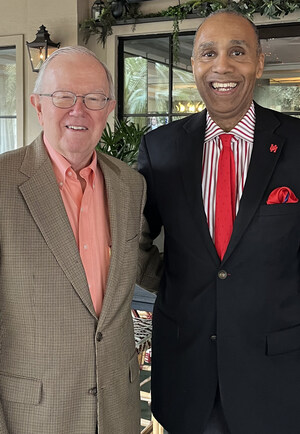HOUSTON, Aug. 26, 2021 /PRNewswire/ -- When it comes to witnessing serious crimes, University of Houston Law Center Associate Professor Zachary D. Kaufman believes that people not only have a moral duty but also should have a legal one to get involved.
Kaufman, who specializes in Criminal Law and International Law, is writing a series of articles, essays, and op-eds about bystanders and upstanders that will culminate in his next book (under contract with Cambridge University Press). These publications focus on "Bad Samaritan laws," which Kaufman defines in his writing as "statutes that impose a legal duty to assist others in peril through intervening directly (also known as the duty to rescue) or notifying authorities (also known as the duty to report)."
As part of his research, Kaufman has compiled the most comprehensive global database of Bad Samaritan laws, encompassing U.S., foreign, and international statutes. In this database and an article, "Protectors of Predators or Prey" (published in the Southern California Law Review), Kaufman documents many more Bad Samaritan laws than any other scholar, which demonstrates that these laws are more widespread than previously recognized. Just within the United States, he has found that such laws exist in 29 states and Puerto Rico, and that Congress enacted a very narrow one, the Protecting Young Victims from Sexual Abuse and Safe Sport Authorization Act, in 2018. As Kaufman has noted, Texas alone has three Bad Samaritan laws: a duty to report felonies in which a reasonable person would believe that serious bodily injury or death may have resulted, a duty to rescue or report in the context of aggravated sexual assault of a child, and a duty to report child abuse or neglect.
Kaufman supports Bad Samaritan laws in limited contexts. Specifically, he argues in an article, "Digital Age Samaritans" (published in the Boston College Law Review), that all U.S. states and territories should impose on witnesses a legal duty to report specified violent offenses (murder, kidnapping, sexual assault, aggravated assault, and felonious assault) when it would be safe and reasonable to do so. Where such statutes exist but don't already apply to the serious crimes Kaufman has enumerated, he thinks the laws should be revised to do so. He also recommends other features of Bad Samaritan laws. For example, as he argues in an op-ed in the San Francisco Chronicle, he thinks that such statutes should not be restricted to child victims, as the duty-to-report laws in California and Nevada currently are. As Kaufman asserts in this op-ed, "adolescents and adults need and deserve protection, too." Assembling all of his policy prescriptions, Kaufman proposes in "Digital Age Samaritans" a model duty-to-report law for the modern era that legislators could use as they amend or enact Bad Samaritan laws.
In his recent research, Kaufman argues that awareness and reporting of serious crimes can be facilitated by technological innovations. In "Digital Age Samaritans," he examines witnesses who view offenses remotely. "Modern technology enables a potentially massive, distributed audience to view, document, and share evidence of crimes," he wrote in the article. "Electronic transmission and receipt of this material through, for example, social media and mobile devices, raises legal, moral, and practical questions about spectators' responsibilities."
After conducting extensive research, Kaufman arrived at various potential opportunities that social media and mobile devices provide crime witnesses in these situations. He argues that this technology "enables users to observe crimes, preserve evidence for potential investigations and prosecutions, raise the public's awareness of misconduct, and assist victims or police after or even during the commission of offenses." He further notes that prosecutors "can benefit from these opportunities to obtain convictions in situations that would have been more difficult in the past."
A recent, high-profile example of a crime witness facing a choice about how to respond occurred amid Derek Chauvin's killing of George Floyd on May 25, 2020. In an op-ed in the Houston Chronicle, Kaufman commends the actions of Darnella Frazier, whose recording of the killing went viral. While arguing that a Bad Samaritan law didn't and shouldn't legally require civilians to record or report police brutality, Kaufman states that Frazier's video was crucial, and perhaps even essential, in convicting Chauvin of murder and manslaughter.
Besides arguing why and how certain bystanders should be prodded to be upstanders, Kaufman has contributed to conceptual understanding of these two categories of witnesses. In both Protectors of Predators or Prey and Digital Age Samaritans he created nuanced, novel typologies of bystanders and upstanders that increase comprehension of the variety of these spectators.
Kaufman's research and recommendations about Bad Samaritan laws have attracted attention from both academics and policymakers. The Southeastern Association of Law Schools (SEALS) awarded Protectors of Predators or Prey SEALS's 2020 Call for Papers Award, an annual prize for excellence in scholarship on any subject by a professor of any rank at a SEALS member school. Legislators at the state and federal levels have taken interest in recommendations contained in Kaufman's scholarship. For example, Rep. Jackie Speier incorporated his proposed language about bystander intervention training into the State Harassment and Assault Prevention and Eradication (SHAPE) Act.
Kaufman's publications to date on bystanders, upstanders, and Bad Samaritan laws include:
- The Law and Politics of Bystanders and Upstanders (book forthcoming with Cambridge University Press)
- Digital Age Samaritans (article published by the Boston College Law Review)
- Protectors of Predators or Prey: Bystanders and Upstanders amid Sexual Crimes (article published by the Southern California Law Review)
- Lessons from Rwanda: Post-Genocide Law and Policy (article published by Stanford Law & Policy Review)
- Prod Bystanders to be "Upstanders" like Darnella Frazier (op-ed published by the Houston Chronicle)
- What Makes People Save Lives? Learning from Upstanders and Bystanders (op-ed published by the New York Daily News)
- No Cover for Abusers; California Must Close Gap in its Duty-to-Report Law (op-ed published by the San Francisco Chronicle)
- When Sexual Abuse is Common Knowledge – But Nobody Speaks Up (op-ed published by the Boston Globe)
- Give the Nobel Peace Prize Posthumously (essay published by Foreign Policy magazine)
- Islam is (Also) a Religion of Peace (essay published by Foreign Policy magazine)
Kaufman is Associate Professor of Law and Political Science in the Law Center, where he is Co-Director of the Criminal Justice Institute and teaches Criminal Law, International Law, and a seminar on International Justice and Atrocities. A Life Member of the Council on Foreign Relations, Kaufman currently serves as both Co-Chair of the American Society of International Law's Human Rights Interest Group and Secretary (and future Chair) of the Association of American Law Schools' International Human Rights Section. Two months ago, Kaufman testified before the Belgian Parliament about international and domestic options to prosecute suspected Islamic State members, including more than 500 Belgian citizens and residents who allegedly joined or supported the Islamic State.
UHLC media contacts: Carrie Anna Criado, UH Law Center Assistant Dean of Communications and Marketing, 713-743-2184, [email protected]; Elena Hawthorne, Assistant Director of Communications and Marketing, 713-743-1125, [email protected]; and John Brannen, Media Relations Rep, 713-743-3055, [email protected].
About the University of Houston Law Center
The University of Houston Law Center (UHLC) is a dynamic, top tier law school located in the nation's 4th largest city. UHLC's Health Law, Intellectual Property Law, and Part-time programs rank in the U.S. News Top 10. It awards Doctor of Jurisprudence (J.D.) and Master of Laws (LL.M.) degrees, through its academic branch, the College of Law. The Law Center is more than just a law school. It is a powerful hub of intellectual activity with more than 11 centers and institutes which fuel its educational mission and national reputation. UHLC is fully accredited by the American Bar Association and is a member of the Association of American Law Schools.
About the University of Houston
The University of Houston is a Carnegie-designated Tier One public research university recognized with a Phi Beta Kappa chapter for excellence in undergraduate education. UH serves the globally competitive Houston and Gulf Coast Region by providing world-class faculty, experiential learning and strategic industry partnerships. Located in the nation's fourth-largest city and one of the most ethnically and culturally diverse regions in the country, UH is a federally designated Hispanic- and Asian-American-Serving institution with enrollment of more than 47,000 students.
SOURCE University of Houston Law Center

Related Links
WANT YOUR COMPANY'S NEWS FEATURED ON PRNEWSWIRE.COM?
Newsrooms &
Influencers
Digital Media
Outlets
Journalists
Opted In






Share this article